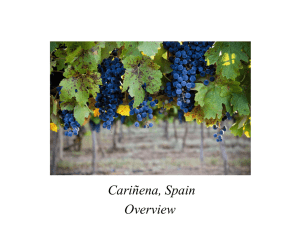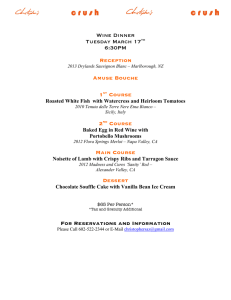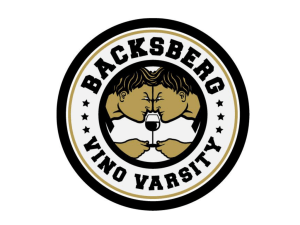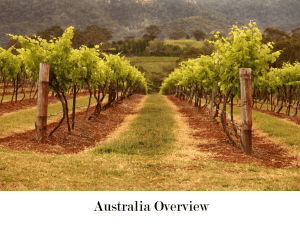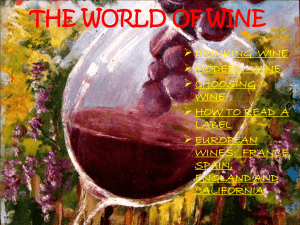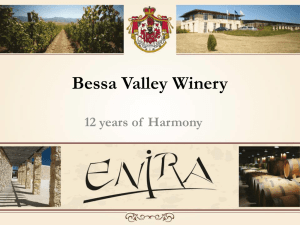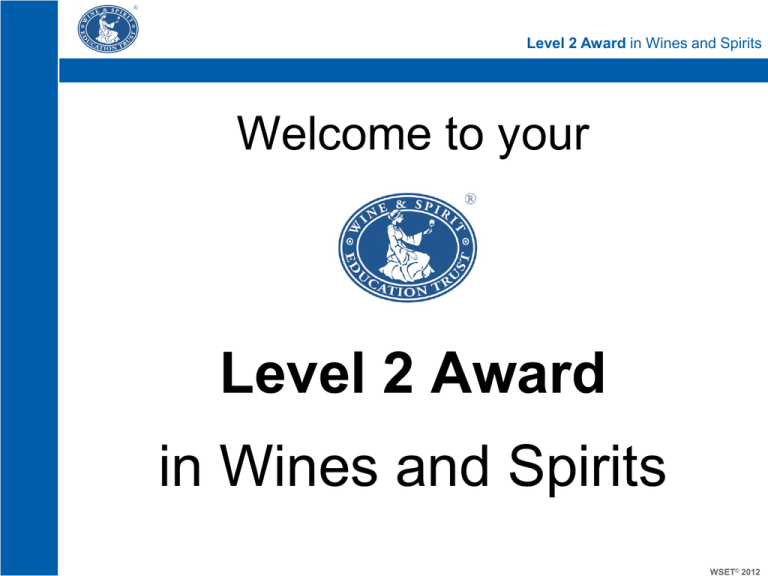
Level 2 Award in Wines and Spirits
Welcome to your
Level 2 Award
in Wines and Spirits
WSET© 2012
Level 2 Award in Wines and Spirits
Session 1:
wine tasting
storage of wine
food and wine pairing
WSET® Level 2
Award
in Wines and Spirits
WSET© 2012
Level 2 Award in Wines and Spirits
wine tasting
Tasting Notes
• provide a personal record of
wines tasted
•
assist in the description of a
wine to others
•
•
help assess the quality of wine
help monitor progress of wine
WSET© 2012
Level 2 Award in Wines and Spirits
wine tasting
Ideal Conditions
• no distracting odours
• good natural light
• clean white surfaces
• a clean palate
• correctly filled ISO glass
WSET© 2012
Level 2 Award in Wines and Spirits
wine tasting
Level 2 Systematic Approach to Tasting Wine ®
APPEARANCE
clarity
clear – hazy
intensity
pale – medium – deep
colour
white
lemon – gold – amber
rosé
pink – salmon – orange
red
purple – ruby – garnet – tawny
WSET© 2012
Level 2 Award in Wines and Spirits
wine tasting
Level 2 Systematic Approach to Tasting Wine ®
NOSE
condition
clean – unclean
intensity
light – medium – pronounced
aroma
characteristics
e.g. fruits, flowers, spices, vegetables, oak
aromas, other
WSET© 2012
Level 2 Award in Wines and Spirits
wine tasting
Level 2 Systematic Approach to Tasting Wine ®
PALATE
sweetness
dry – off-dry – medium – sweet
acidity
low – medium – high
tannin
low – medium – high
body
light – medium – full
flavour
characteristics
e.g. fruits, flowers, spices, vegetables, oak
flavours, other
finish
short – medium – long
WSET© 2012
Level 2 Award in Wines and Spirits
wine tasting
Level 2 Systematic Approach to Tasting Wine ®
CONCLUSIONS
quality
faulty – poor – acceptable – good – very good –
outstanding
WSET© 2012
Level 2 Award in Wines and Spirits
Level 2 Systematic Approach to Tasting Wine®
APPEARANCE
clarity
clear – hazy
intensity
pale – medium – deep
colour
white
rosé
red
lemon – gold – amber
pink – salmon – orange
purple – ruby – garnet – tawny
NOSE
condition
clean – unclean
intensity
light – medium – pronounced
aroma characteristics
e.g. fruits, flowers, spices, vegetables, oak aromas, other
PALATE
sweetness
dry – off-dry – medium – sweet
acidity
low – medium – high
tannin
low – medium – high
body
light– medium – full
flavour characteristics
e.g. fruits, flowers, spices, vegetables, oak flavours, other
finish
short – medium – long
CONCLUSIONS
quality
faulty – poor – acceptable – good – very good – outstanding
WSET© 2012
Level 2 Award in Wines and Spirits
storage and service
Storage of Wine
• store at a constant 10 – 15°C
• store wine sealed with a cork
on its side
• store away from strong light
• store away from vibration
WSET© 2012
Level 2 Award in Wines and Spirits
storage and service
Service of Wine
Service temperature: white, rosé, sparkling
wine style
medium/full- bodied oaked
white
e.g. white Burgundy
light/medium-bodied white
e.g. Pinot Grigio
sweet wines
e.g. Sauternes
sparkling wines
e.g. Champagne, Cava
service temperature
slightly chilled
10 - 13°C (50 – 55°F)
chilled
7 - 10°C (45 – 50°F)
well chilled
6 - 8°C (43 – 45°F)
well chilled
6 - 10°C (43 – 50°F)
WSET© 2012
Level 2 Award in Wines and Spirits
storage and service
Service of Wine
service temperature: red wine
wine style
light- bodied red
e.g. Beaujolais
Medium/full-bodied red
e.g. Australian Shiraz
service temperature
lightly chilled
13°C (55°F)
Room temperature
15 - 18°C (59 – 64°F)
WSET© 2012
Level 2 Award in Wines and Spirits
storage and service
Service of Wine
• glassware
• equipment
WSET© 2012
Level 2 Award in Wines and Spirits
storage and service
Service of Wine
opening a bottle of still wine
WSET© 2012
Level 2 Award in Wines and Spirits
storage and service
Service of Wine
opening a bottle of sparkling wine
WSET© 2012
Level 2 Award in Wines and Spirits
storage and service
Social and Professional Responsibility
four key legal areas
• legal age to purchase and consume alcohol
• blood alcohol concentrations for drivers
• sensible drinking guidelines
• restrictions covering the marketing, packaging and
sale of alcohol
WSET© 2012
Level 2 Award in Wines and Spirits
storage and service
Social and Professional Responsibility
legal age to purchase and legal drinking age
• legal minimums are set in most countries
• limits young peoples access to alcohol
• the legal purchasing and drinking age are often
different
WSET© 2012
Level 2 Award in Wines and Spirits
storage and service
Social and Professional Responsibility
blood alcohol concentration (BAC)
• alcohol can impair the abilities of drivers and
operators of dangerous machinery
• most countries have legal limits
• “designated driver” best practice
WSET© 2012
Level 2 Award in Wines and Spirits
storage and service
Social and Professional Responsibility
sensible drinking guidelines
• women should not exceed an average of 2 units a day
• men should not exceed an average of 3 units a day
• try not to exceed four units on any one occasion
• try to have one or two alcohol free days a week
standard drinks
• W.H.O. guidelines a unit is 10-12ml of alcohol
WSET© 2012
Level 2 Award in Wines and Spirits
storage and service
Social and Professional Responsibility
the risk of drinking to drunkenness
• an increased risk of injury
• a greater risk of having unsafe sex
• an increased risk of fights and arguments
• risk of alcohol poisoning, coma and brain damage
WSET© 2012
Level 2 Award in Wines and Spirits
storage and service
Social and Professional Responsibility
health risks of excess drinking
• alcohol dependence
• cirrhosis of the liver
• stomach disorders
• increased risk of certain types of cancer
• family and job related difficulties
WSET© 2012
Level 2 Award in Wines and Spirits
food and wine pairing
How to Pair Food with Wine
• Don’t be ruled by rules!
• We are all different so personal
preferences do matter
• It is food that causes more problems
than wine
• Most wines will be relatively palatable
for most people with most foods
22
WSET© 2012
Level 2 Award in Wines and Spirits
food and wine pairing
Taste Tolerance Levels
Tolerant
Sensitive
Very Sensitive
Generally like strong
flavoured foods and drinks
Generally like a range of foods
and drinks but prefers to have
some intensity of flavour and
may be sensitive to bitterness
Very sensitive to bitterness and
astringency making some food
wine reactions more extreme,
sensitive to bitterness in artificial
sweeteners
Like:
Strong black coffee
Like:
Full-flavoured coffee but will
usually take milk and/or small
amounts of sugar
Like:
Delicate teas and/or coffee with
cream or sweetened
Powerful concentrated red
wines with high levels of
tannin, oak and alcohol such
as some Italian wines and
Cabernet Sauvignon
Ripe red wines such as Shiraz,
full flavoured whites such as
Sauvignon Blanc, oaked and
full bodied white wines
Wines with delicate flavours and
maybe some moderate amounts
of sweetness such as blush
wines, sweeter styles of Riesling
or more delicate reds with lower
levels of tannins such as Pinot
Noir
WSET© 2012
Level 2 Award in Wines and Spirits
food and wine pairing
Food and Wine Pairing
Food is…
Wine seems…
This means…
Sweet
More drying and bitter, more acidic
Less sweet and fruity
Take care pairing with wines with
less sweetness or with tannins
Savoury
(Umami)
More drying and bitter, more acidic
Less sweet and fruity
Take care pairing with wines with
high levels of tannins or oak
character
Salty
Less drying and bitter, less acidic
Smoother and richer
Salt can make tannic wines seem
more palatable
Acidic
Less bitter and acidic
Fruitier, sweeter and richer
Take care pairing with wines with
less acidity
Highly
flavoured
Overwhelmed by the food flavours
Pair with wines with similar intensity
of flavours
Fatty/Oily
Less acidic
Pair with wines with high levels of
acidity
Hot (chili)
More drying and bitter, less sweet and
less fruity. Increases heat from chilli
Pair with wines light in alcohol, fruity
and maybe some sweetness
WSET© 2012

